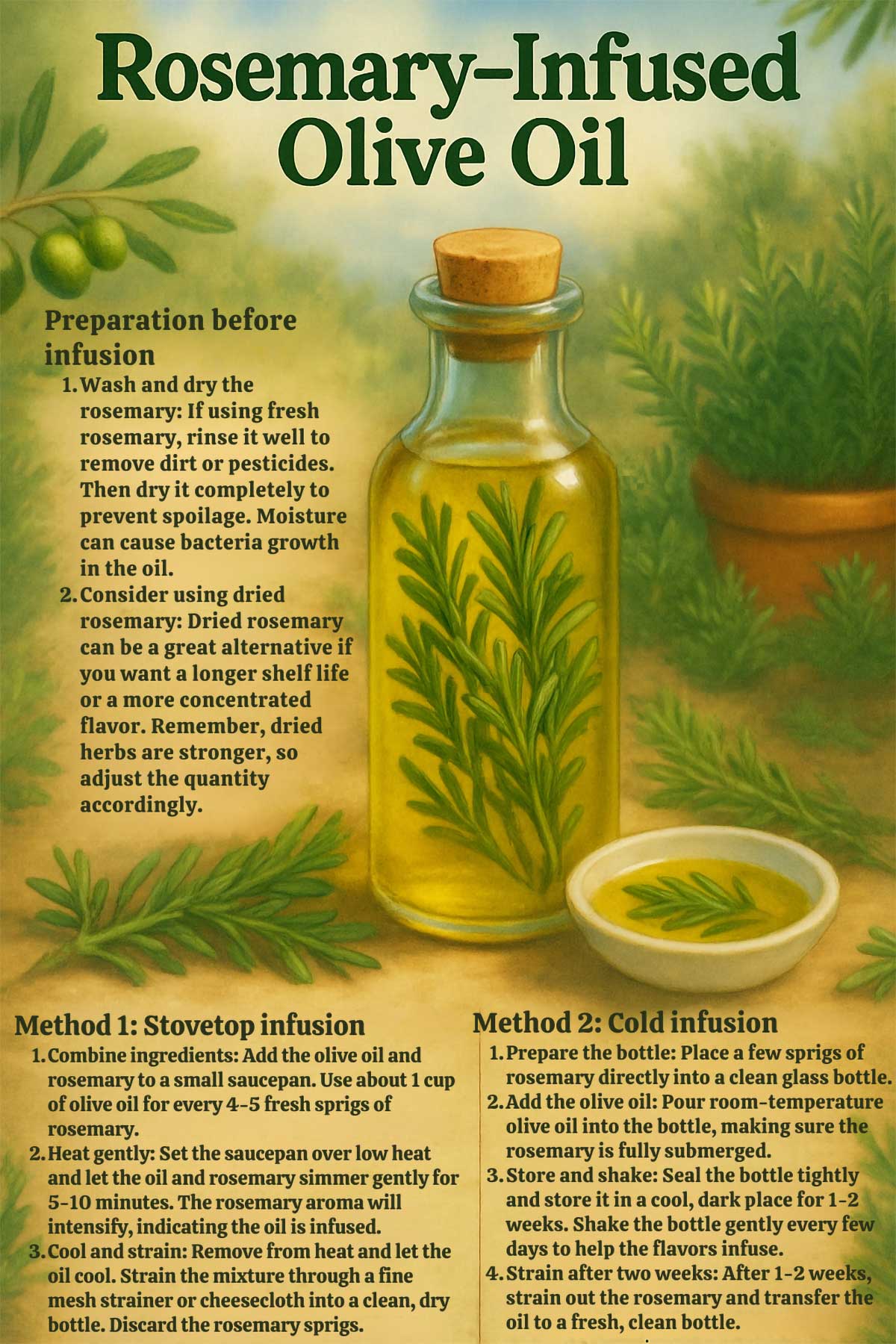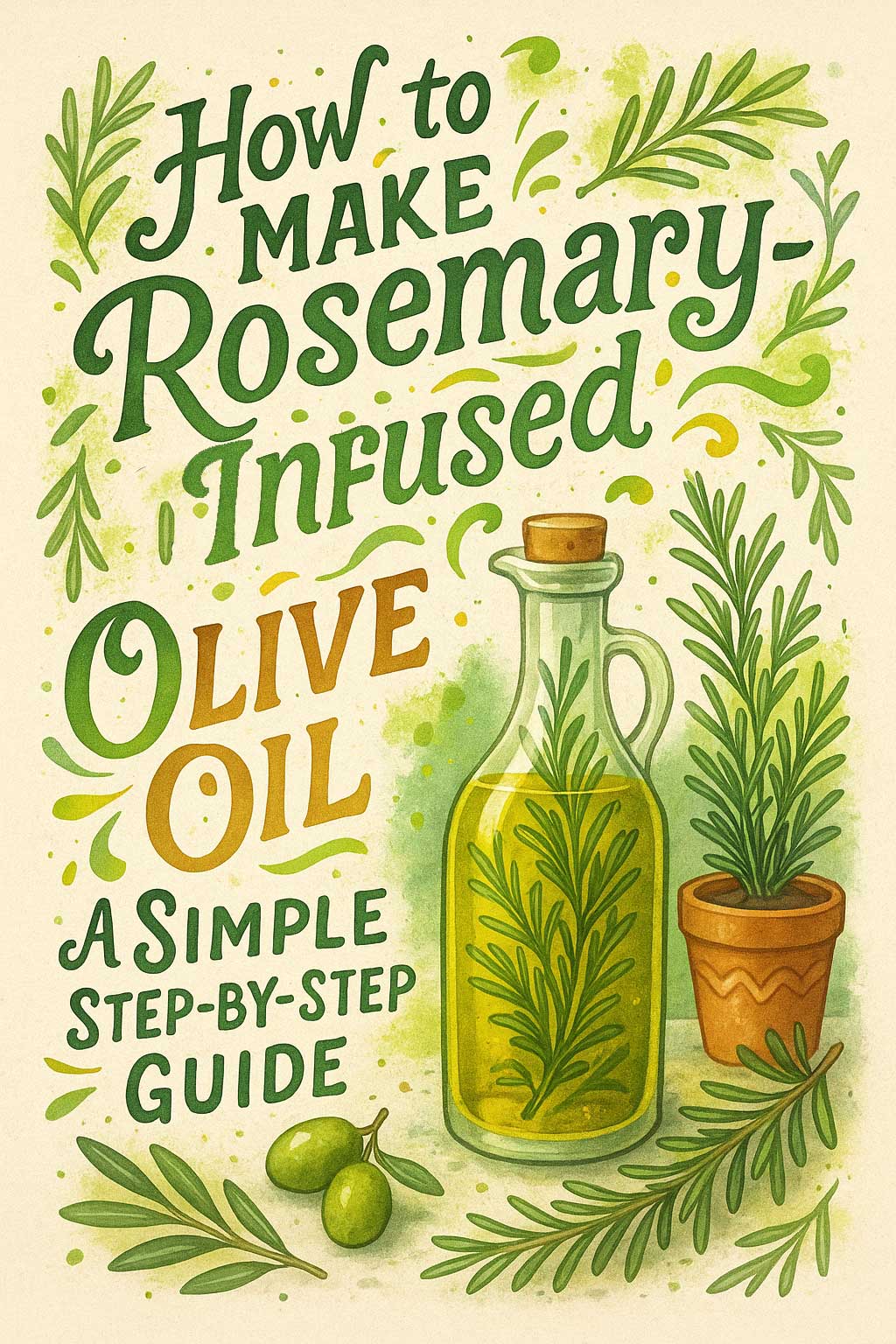Imagine hosting a dinner party and serving warm, crusty bread with a dish of your homemade rosemary-infused olive oil for dipping. The fresh, herbal notes combined with the richness of the olive oil elevate even the simplest of meals into something extraordinary. Whether you’re using it to enhance salads or flavor roasted vegetables, this infused oil adds an aromatic, gourmet touch to your dishes.
Not only is rosemary-infused olive oil a versatile addition to your kitchen, but it also brings added health benefits from both rosemary and olive oil. Making this infusion at home is surprisingly simple and allows you to control the quality and freshness of the ingredients. Plus, it’s much more cost-effective than buying pre-made versions.

Why make your own rosemary-infused olive oil?
Benefits of homemade infused oils
There are several reasons to make your own rosemary-infused olive oil:
- Control over quality: When you make it yourself, you get to choose high-quality ingredients, like premium extra virgin olive oil and fresh rosemary.
- Freshness: Store-bought versions may sit on shelves for months, losing their vibrancy. Homemade oil lets you enjoy the fresh, full flavors of rosemary immediately.
- Customization: You can tailor the infusion to your liking. Want a subtler taste? Use fewer sprigs. Want it bolder? Add more. You can even combine rosemary with other ingredients like garlic, lemon zest, or chili flakes for unique flavor profiles.
Extra Tip: Try pairing rosemary with lemon zest for a bright, citrusy flavor, or add a clove of garlic for a savory twist. The possibilities are endless!
Health benefits of rosemary and olive oil
Both rosemary and olive oil have notable health benefits:
- Olive oil: Rich in heart-healthy monounsaturated fats and antioxidants, which help reduce inflammation and lower your risk of chronic diseases.
- Rosemary: Contains anti-inflammatory compounds and antioxidants. It supports digestion, boosts cognitive function, and may even enhance mood.
By making your own rosemary-infused olive oil, you’re creating a delicious and nutritious addition to your meals.
Ingredients and abilities needed
Simple ingredients for rosemary-infused olive oil
- Fresh rosemary: Fresh sprigs give the best flavor, but dried rosemary can be used if fresh is unavailable.
- Extra virgin olive oil: Choose high-quality extra virgin olive oil for the best taste and health benefits.
- Optional extras: You can enhance the flavor by adding garlic, chili flakes, or lemon zest.
Tip: If you’re using dried rosemary, you’ll need less than fresh because dried herbs are more concentrated. Start with about half the amount you’d use for fresh.
Essential abilities for the infusion process
- Small saucepan or double boiler: For the stovetop method.
- Fine mesh strainer or cheesecloth: To strain the oil after infusion.
- Airtight glass bottle or jar: Preferably dark glass bottles to protect the oil from light and help it last longer.
Fresh vs. Dried Rosemary: Which Works Best?
| Characteristic | Fresh Rosemary | Dried Rosemary |
|---|---|---|
| Flavor profile | Bright, pine-like, aromatic | More concentrated, slightly earthier |
| Amount needed | 4-5 sprigs per cup of oil | 1-2 tablespoons per cup of oil |
| Infusion time | Longer (1-2 weeks for cold method) | Shorter (3-5 days for cold method) |
| Shelf life of infused oil | 2-3 weeks refrigerated | 3-4 weeks refrigerated |
| Best uses | Finishing oils, dressings | Cooking, marinades |
How to make rosemary-infused olive oil (step-by-step guide)
Preparation before infusion
- Wash and dry the rosemary: If using fresh rosemary, rinse it well to remove dirt or pesticides. Then dry it completely to prevent spoilage. Moisture can cause bacteria growth in the oil.
- Consider using dried rosemary: Dried rosemary can be a great alternative if you want a longer shelf life or a more concentrated flavor. Remember, dried herbs are stronger, so adjust the quantity accordingly.
Method 1: Stovetop infusion (quick method)
- Combine ingredients: Add the olive oil and rosemary to a small saucepan. Use about 1 cup of olive oil for every 4-5 fresh sprigs of rosemary.
- Heat gently: Set the saucepan over low heat and let the oil and rosemary simmer gently for 5-10 minutes. The rosemary aroma will intensify, indicating the oil is infused.
- Cool and strain: Remove from heat and let the oil cool. Strain the mixture through a fine mesh strainer or cheesecloth into a clean, dry bottle. Discard the rosemary sprigs.
Tip: Don’t let the oil boil! Overheating can degrade the quality of both the oil and rosemary. Keep the heat low and stir occasionally.
Method 2: Cold infusion (longer, no-heat method)
- Prepare the bottle: Place a few sprigs of rosemary directly into a clean glass bottle.
- Add the olive oil: Pour room-temperature olive oil into the bottle, making sure the rosemary is fully submerged.
- Store and shake: Seal the bottle tightly and store it in a cool, dark place for 1-2 weeks. Shake the bottle gently every few days to help the flavors infuse.
- Strain after two weeks: After 1-2 weeks, strain out the rosemary and transfer the oil to a fresh, clean bottle.
Tip: If you notice any off smells or cloudiness while infusing, it’s best to discard the oil and start fresh. These could be signs of bacterial growth or spoilage.

Safety Considerations: Preventing Botulism
Homemade infused oils can pose a botulism risk if not prepared properly. Botulism is a serious foodborne illness caused by bacteria that thrive in low-oxygen, low-acid environments like oil.
| Safety Measure | Why It’s Important |
|---|---|
| Thoroughly dry herbs | Moisture creates an environment where bacteria can grow |
| Refrigerate infused oils | Cold temperatures slow bacterial growth |
| Use within 1-2 weeks | Reduces time for potential bacterial development |
| Watch for signs of spoilage | Cloudy appearance, bubbles, off smells indicate unsafe oil |
Important: If you’re concerned about safety, adding a tablespoon of vinegar or lemon juice to your oil can help create a more acidic environment that’s less hospitable to bacteria. However, this will alter the flavor profile slightly.
Storage and shelf life tips
Maximizing Shelf Life
Proper storage is crucial for both safety and flavor preservation:
| Storage Method | Expected Shelf Life | Best Practices |
|---|---|---|
| Room temperature | 1 week | Keep in dark cabinet, away from heat sources |
| Refrigerated | 2-4 weeks | Store in airtight container; allow to reach room temperature before using |
| Freezer (in ice cube trays) | Up to 3 months | Freeze in small portions for easy use in cooking |
How to properly store your infused olive oil
- Store the oil in an airtight bottle to prevent air from spoiling it.
- Keep it in a cool, dark place like a pantry. Avoid exposure to sunlight or heat.
- Dark glass bottles (like amber or green) are best for preserving the quality.
Troubleshooting Tip: If the oil becomes cloudy, smells rancid, or shows any signs of mold, discard it. These are clear indicators that the oil has spoiled.
Troubleshooting Common Issues
| Problem | Possible Cause | Solution |
|---|---|---|
| Bitter taste | Overheated oil or too much rosemary | Use lower heat and fewer herbs; infuse for less time |
| Cloudy appearance | Moisture in herbs or container | Ensure herbs are completely dry; use dry, sterilized containers |
| Weak flavor | Not enough rosemary or insufficient infusion time | Add more herbs or extend infusion time |
| Oil solidifies in refrigerator | Normal behavior of olive oil at cold temperatures | Let stand at room temperature before using |
| Mold or bubbles | Bacterial contamination | Discard immediately; ensure better drying and sanitation next time |
Expert Tips for Perfect Rosemary-Infused Olive Oil
- Quality matters: The better your olive oil, the better your infusion will taste.
- Bruise the herbs: Gently crush rosemary needles before infusing to release more essential oils.
- Balance is key: Start with less rosemary and add more to taste—you can’t remove it once added.
- Label clearly: Mark your bottles with the date made and ingredients used.
- Gift presentation: For homemade gifts, add a fresh sprig of rosemary to the bottle for visual appeal.
Delicious ways to use rosemary-infused olive oil
Cooking ideas and recipes
- Drizzle over roasted vegetables: like potatoes, carrots, or squash for a flavorful boost.
- Use in salad dressings: by mixing it with lemon juice or balsamic vinegar for a simple, herb-infused vinaigrette.
- Brush onto bread: before grilling or toasting for extra flavor.
- Marinade for meats: Rosemary pairs beautifully with lamb, chicken, or pork. Marinate the meat for a few hours in the oil before grilling or roasting.
Try This Simple Rosemary Vinaigrette:
- 1/4 cup rosemary-infused olive oil
- 1 tbsp balsamic vinegar
- 1 tsp Dijon mustard
- Salt and pepper to taste
Whisk all ingredients together and drizzle over your favorite salad for a quick, flavorful meal.
Seasonal Variations and Flavor Combinations
Customize your rosemary-infused olive oil with these seasonal combinations:
| Season | Complementary Ingredients | Perfect Pairings |
|---|---|---|
| Spring | Lemon zest, thyme | Grilled asparagus, fresh salads |
| Summer | Basil, garlic | Tomato dishes, grilled vegetables |
| Fall | Sage, orange peel | Roasted root vegetables, squash |
| Winter | Chili flakes, black pepper | Hearty soups, roasted meats |
Rosemary-Infused Olive Oil for Beauty and Wellness
Hair Care Benefits
Rosemary oil has been shown to promote hair growth and reduce hair loss when used regularly. The combination with olive oil creates a nourishing treatment that can:
- Stimulate blood circulation to the scalp
- Strengthen hair follicles
- Add shine to dull hair
- Help reduce dandruff
DIY Rosemary Hair Treatment
- Warm 2-3 tablespoons of your rosemary-infused olive oil
- Massage into your scalp and work through to the ends
- Cover with a shower cap and leave for 30-45 minutes
- Wash thoroughly with shampoo (may require two washes)
- Use weekly for best results
Skin Benefits
The antioxidants in both rosemary and olive oil make this infusion excellent for skin care:
- Helps reduce inflammation and redness
- Provides deep moisturization
- May help reduce the appearance of fine lines
- Has natural antimicrobial properties
Application Tip: For a simple moisturizer, apply a few drops to damp skin after showering. For a facial treatment, gently massage 3-4 drops into clean skin before bed.
Non-culinary uses of rosemary-infused olive oil
- Skincare: Apply a small amount to dry skin for its moisturizing and soothing properties.
- Hair treatments: Massage a few drops into the scalp to nourish hair and promote hair growth. Leave it in for about 30 minutes before rinsing with shampoo.
- Aromatherapy: Add a few drops to a diffuser with water for a natural, calming scent throughout your home.
- Wood polish: Use a small amount on a soft cloth to polish and condition wooden cutting boards and utensils.
Conclusion
Making rosemary-infused olive oil at home is easy and rewarding. You’ll enjoy the fresh flavors and health benefits of rosemary and olive oil, while adding a gourmet touch to your cooking. Once you’ve mastered this, why stop there? Try experimenting with other herbs like thyme or oregano, or seasonal additions like basil in summer or sage in the fall.
Homemade infused oils are an easy way to add creativity and personalization to your meals. Just remember to follow the safety guidelines to ensure your infused oil remains fresh and safe to consume. So grab some fresh rosemary and olive oil, and start your infusion today!

FAQs
Can I use dried rosemary instead of fresh rosemary?
Yes, dried rosemary can be used, but it has a stronger, more concentrated flavor. Start with a smaller amount compared to fresh rosemary, and adjust to taste.
How long does it take for rosemary to infuse in olive oil?
If using the stovetop method, the infusion takes about 5-10 minutes of simmering. For the cold infusion method, let the rosemary sit in the oil for 1-2 weeks for a fuller flavor.
Does rosemary go bad in olive oil?
Yes, rosemary can spoil if not properly dried before being added to the oil. To avoid spoilage, make sure the rosemary is fully dry, and store the infused oil in a cool, dark place.
What happens if you leave rosemary in oil for too long?
Leaving rosemary in the oil too long can make the oil bitter. Additionally, if fresh rosemary is left too long, it can introduce moisture, which may cause the oil to spoil faster.
What oil is best for rosemary infusion?
Extra virgin olive oil is the best choice for rosemary infusion due to its mild flavor and health benefits. Other neutral oils like grapeseed or avocado oil also work well.
Why is my rosemary-infused olive oil cloudy?
Cloudiness can occur if moisture or small particles remain in the oil. To avoid this, ensure the rosemary is completely dry, and strain the oil thoroughly before storing.
How long does homemade rosemary-infused olive oil last?
Homemade rosemary-infused olive oil lasts about 2-3 weeks if stored in a cool, dark place. For longer storage, keep it in the refrigerator, but allow it to come to room temperature before using.
Can you infuse olive oil with rosemary for hair?
Yes, rosemary-infused olive oil can be used as a hair treatment. Massage it into your scalp to nourish your hair and promote hair growth. Leave it in for 30 minutes before rinsing with shampoo.
Can I leave homemade rosemary oil in my hair?
Yes, you can leave the rosemary-infused olive oil in your hair for up to 30 minutes as a deep conditioning treatment. However, avoid leaving it in overnight, especially if using rosemary essential oil, to prevent scalp irritation.
How long should I soak rosemary in oil for hair growth?
To make a rosemary-infused oil for hair growth, soak the rosemary in olive oil for 1-2 weeks using the cold infusion method. Apply the oil to the scalp and hair, leaving it on for 30 minutes before rinsing.
Can I reuse the rosemary sprigs after straining?
It’s not recommended to reuse rosemary sprigs after they’ve been infused because most of the flavor and oils will have been extracted. Always use fresh sprigs for the best results.
Is there a way to speed up the cold infusion process?
Yes, you can slightly warm the olive oil before adding it to the rosemary for cold infusion. Be sure the oil is warm, not hot, to prevent the rosemary from wilting or spoiling.


